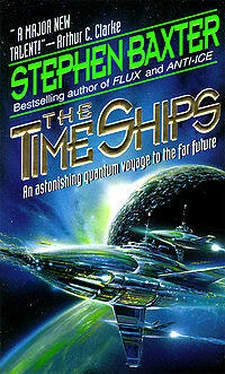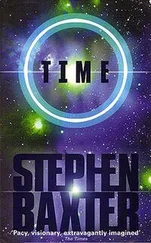Wallis cocked an eyebrow at me. “He’s a rum cove,” he whispered, “but a remarkable mind.”
There were book-shelves all around the room, though currently bare; the carpet was piled high with crates, and books and journals — mostly in German — had spilled out in uneven piles. In one crate I caught a glimpse of scientific equipment, and various sample bottles — and in one such, I saw something which made my heart pound with excitement!
I turned resolutely from the crate, and tried to conceal my agitation.
At last, with a gasp of exasperation, the man at the desk hurled his pen from him — it clattered against a wall — and he crumpled the written pages within his fists, before discarding the whole lot — everything he had written — in a wastebin!
Now he glanced up, as if noticing we were there for the first time. “Ah,” he said. “Wallis.” He tucked his hands behind his desk and seemed to shrink inside himself.
“Professor Gödel, it’s good of you to let us visit you. This is—” He introduced me.
“Ah,” Gödel said again, and he grinned, showing uneven teeth. “Of course.” Now he stood, in angular jerks, and stepped around the desk and proffered his hand. I took it; it was thin, bony and cold. He said, “The pleasure is mine. I anticipate we will have many engrossing discussions.” His English was good, lightly accented.
Wallis took the initiative and waved us to a set of arm-chairs close to the window.
“I hope you find a place for yourself in this New Age,” Gödel said to me sincerely. “It may be a little more savage than the world you remember. But perhaps, like me, you will be tolerated as a useful Eccentric. Yes?”
Wallis blustered, “Oh, come now, Professor—”
“Eccentric,” he snapped. “ Ekkentros — out of the center.” His eyes swiveled to me. “That’s what we both are, I suspect — a little out of the center of things. Come, Wallis, I know you steady British think I’m a little odd.”
“Well—”
“Poor Wallis can’t get used to my habit of my drafting and redrafting my correspondence,” Gödel said to me. “Sometimes I will go through a dozen drafts or more — and still finish by abandoning the piece altogether — as you saw! Is that strange? Well. So be it!”
I said, “You must have some regrets at leaving your home, Professor.”
“None. None. I had to get away from Europe,” he said to me, and his voice was low, like a conspirator’s.
“Why?”
“Because of the Kaiser, of course.”
Barnes Wallis shot me warning glares.
“I have evidence, you know,” Gödel said intently. “Take two photographs — one from 1915, say, and one from this year, of the man purporting to be Kaiser Wilhelm. If you measure the length of the nose, and take its ratio with the distance from the tip of the nose to the point of the chin — you’ll find it different!”
“I — ah — Great Scott!”
“Indeed. And with such a simulacrum at the helm — who knows where Germany is heading? Eh?”
“Quite,” said Wallis hastily. “Anyway, whatever your motives, we’re glad you accepted our offer of a Professorship here — that you chose Britain to make your home.”
“Yes,” I said, “couldn’t you have found a place in America? Perhaps at Princeton, or—”
He looked shocked. “I’m sure I could. But it would be quite impossible. Quite impossible.”
“Why?”
“Because of the Constitution, of course!” And now this extraordinary chap went into a long and rambling discourse on how he had discovered a logical loop-hole in the American Constitution, which would allow the legal creation of a dictatorship!
Wallis and I sat and endured this.
“Well,” Gödel said when he had run down, “what do you think of that?”
I got more stern looks from Wallis, but I decided to be honest. “I can’t fault your logic,” I said, “but its application strikes me as outlandish in the extreme.”
He snorted. “Well — perhaps! — but logic is everything. Don’t you think? The axiomatic method is very powerful.” He smiled. “I also have an ontological proof for the existence of God — quite faultless, as far as I can see — and with honorable antecedents, going back eight hundred years to Archbishop Anselm. You see—”
“Perhaps another time, Professor,” Wallis said.
“Ah — yes. Very well.” He looked from one to other of us — his gaze was piercing, quite unnerving. “So. Time travel. I’m really quite envious of you, you know.”
“For my traveling?”
“Yes. But not for all this tedious hopping about through History.” His eyes were watery; they gleamed in the strong electric light.
“What, then?”
“Why, for the glimpses of other Worlds than this — other Possibilities — do you see?”
I felt chilled; his grasp seemed extraordinary — almost telepathic. “Tell me what you mean.”
“The reality of other Worlds, containing a meaning beyond that of our brief existence, seems evident to me. Anyone who has experienced the wonder of mathematical discovery must know that mathematical Truths have an independent existence from the minds in which they lodge — that the Truths are splinters of the thoughts of some higher Mind…
“Look: our lives, here on earth, have but a dubious meaning. And so their true significance must lie outside this world. Do you see? So much is mere logic. And the idea that everything in the world has an ultimate Meaning is an exact analogue of the principle that everything has a Cause — a principle on which rests all of science.
“It follows, immediately, that somewhere beyond our History is the Final World — the World where all Meaning is resolved.
“Time travel, by its very nature, results in the perturbation of History, and hence the generation, or discovery, of Worlds other than this. Therefore the task of the Time Traveler is to search — to search on, until that Final World is found — or built!”
By the time we left Gödel, my thoughts were racing. I resolved never to mock Mathematical Philosophers again, for this odd little man had journeyed further in Time, Space and Understanding, without leaving his office, than I ever had in my Time Machine! And I knew that I must indeed visit Gödel again soon… for I was convinced that I had seen a flask of raw Plattnerite, tucked inside his crate!
I was returned to our lodging at about six. I came in calling halloos, and found the rest of my party in the smoking-room. The Morlock was still poring over his notes — he seemed to be trying to reconstruct the whole of this future science of Quantum Mechanics from his own imperfect memory — but he jumped up when I came in. “Did you find him? Gödel?”
“I did.” I smiled at him. “And — yes! — you were right.” I glanced at Filby, but the poor old chap was dozing over a magazine, and could not hear us. “ I think Gödel has some Plattnerite.”
“Ah.” The Morlock’s face was as inexpressive as ever, but he thumped one fist into the other palm in a decidedly human gesture. “Then there is hope.”
Now Moses walked up to me; he handed me a glass of what proved to be whisky-and-water. I gulped at the drink gratefully, for the day had stayed as hot as in the morning.
Moses moved a little closer to me, and the three of us bent our heads together and spoke quietly. “I’ve come to a conclusion as well,” Moses said.
“Which is?”
“That we must indeed get out of here — by any means possible!”
Moses told me the story of his day. Growing bored with his confinement, he had struck up conversations with our young soldier-guards. Some of these were privates, but others were Officer-class; and all of those assigned to guard us and to other duties in this scientific campus area were generally intelligent and well-educated. They seemed to have taken a liking to Moses, and had invited him to a nearby hostelry — the Queen’s Arms in Queen’s Gate Mews — and later they had taken rickshaws into the West End. Over several drinks, these young people had evidently enjoyed arguing through their ideas — and the concepts of their new Modern State — with this stranger from the past.
Читать дальше
Конец ознакомительного отрывка
Купить книгу









